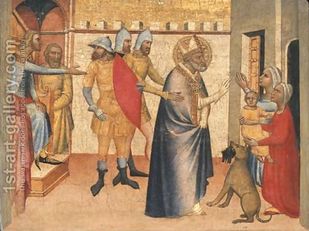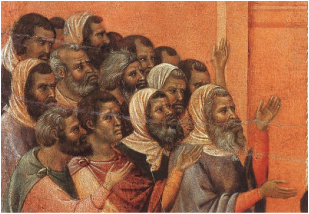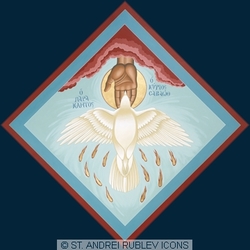 This week we celebrate the feast of St. Blaise, accompanied by a very popular Catholic devotion associated with him. On February 3 we celebrate this bishop about whom we know little yet who is widely remembered for the act of healing someone choking on a fishbone. On his feast day the Church has a tradition of blessing the throats of the faithful through a short ritual which is offered after Mass. Having our throats blessed is indicative of our belief that specific prayer is important to our lives and that praying for health is part of the wholeness which we should desire. Prayer is not a good luck charm, nor is the ritual an ironclad promise that we will never become ill. Rather, it is to help us remember that we trust in God and His love for us. While healing is always a possibility, what is more important is that we recognize that good spiritual, emotional, and physical health are blessings for which we should be immensely grateful, and it reminds us that God is with us no matter what the circumstances. It is about more than simply a fishbone. Though we know little about St. Blaise, the stories about him all agree on a few facts. He lived in the 4th century during the last of the major persecutions levied against Christianity. He was bishop of Sebastia, in Armenia, and died as a martyr. He was known for his kindness, which was not only directed to people. Evidently, there was a time in his life when he hid in a cave in order to escape persecution. It is written that he co-existed peacefully with wild animals in the cave and that he healed the animals of whatever ailed them. However, the story for which he is most remembered is that at some point during his ministry he healed a boy who was choking on a fishbone. In one version of the story, the bone which was stuck in the boy’s throat dissolved. Later, while imprisoned before his martyrdom, Blaise was visited by a woman who brought him candles to dispel the darkness. Somewhere along the line, the two stories intersected and the ritual began in which a priest uses two blessed candles to place on the throats of the faithful, praying for protection from all diseases or illnesses of the throat.  It seems that after the atrocious martyrdom of St. Blaise the legends of his healing gifts spread. Truly, the details of his purported acts are not essential. What is important, however, is that St. Blaise was a man of compassion and sensitivity to every living thing, both the people for whom he was bishop, and the animals which he encountered during his travels. There can be little doubt that he saved the boy who was choking. In this day and age we often read stories of someone saving a choking person through use of the Heimlich maneuver; we do not blink an eye at it, though we may be grateful to know there are good people who will do something heroic to save a life. So to hear that Blaise saved a boy choking on a fishbone is not outlandish at all. But in every saint’s legend, we need to read between the lines of an exaggerated description to ascertain what the point may be in telling these stories. The kernel of truth in the story is where our thoughts ought to converge because here is where the ‘wealth’ lies. In order to find the truth in stories of St. Blaise, let us look to the Gospels. In one passage the Pharisees were accusing the disciples of picking grain on a Sabbath and popping it in their mouths to eat. Worse still, according to the authorities, Jesus’ followers were not purifying their hands properly before eating. Jesus responded by saying, “It is not what enters one’s mouth that defiles that person; but what comes out of the mouth is what defiles one…. But things that come out of the mouth come from the heart, and they defile. For from the heart come evil thoughts, murder, adultery, unchastity, theft, false witness, blasphemy. These are what defile a person, but to eat with unwashed hands does not defile.” (Matthew 15:11; 17-20) This passage reminds us that what is in our hearts is that which is clean or unclean. Perhaps, therein lays the hidden wealth in remembering St. Blaise for healing of throats. Could it be that we should reflect about what emanates from our throat, or in other words, what comes out of our mouths? Perhaps we are in need of healing for what we have said, or for what “gets stuck in our throat” which we ought to have said, but didn’t!  Rather than fixating on what happened with Blaise and the boy, relegating the ritual of blessing of throats to superstition or dismissing the story as nothing more than an exaggeration, perhaps we should spend some time in reflection upon what comes out of our throats, so to speak. Do we spew vile words, not caring about whose feelings we trample or what example it gives to others? Or do we use our words to uplift and to offer hope, mercy, and kindness? In his letter, St. James indicates that we should not bless God with our words, but then turn around and curse people. (James 3:6-12) This is something of which all of us are guilty, given that it is all too easy to fall into this behavior. Therefore let us look to what St. Blaise and the blessing of throats offers. First is that praying for health for our throats is a way of showing our trust in the blessings and gifts of God. It should be taken seriously since the Church obviously would not offer this if it was merely legend, as if to say, “Let’s play it safe with an action that certainly can’t hurt, so what the heck?” The Church does not act this way. Rather it teaches the truth that healing and new life are offered through the sacraments which were instituted by Christ and are part of our core beliefs. Second, what we say with our words has great power no matter who it is directed at, even if it is something we say only to ourselves. Words reflect our attitudes; that is, they reflect what is in our hearts. Often we try to rationalize our actions (or lack of action) by talking ourselves into believing something that we know deep down inside is not true. It may be an attempt to feel less guilty, perhaps about something we should not have done, or about an attitude we hold which is unhealthy. We can also let words come forth from our throats which are hurtful, full of gossip, conjecture, or assumption. We can speak words that are meant to hurt, becoming defensive or offensive, not caring about the damage they might do to the other. We can tell that ‘little white lie’ which we think really doesn’t hurt anyone, but which is perilous, because lying can become habitual. And who of us has not said something we vehemently wish that we could take back a nanosecond after it emerged from our mouths?  A blessing offers many graces, such as those which help us to think twice before we say something hurtful, to consider the impact of what we are about to say. A blessing can help us to find our voices, too. It can empower us to speak up when it is a matter of justice or to help the voiceless find a voice. A blessing can also be the way to receive the mercy of God who forgives us for what we may have uttered. It is the way to become empowered to speak words which heal rather than words which injure. It can be the means to discover when it is best to keep silent to listen to the other, and the means to hear God’s voice over the din of our own noise. Certainly St. Blaise has much to offer us in remembering that we can choke on more than simply a fishbone. Let us enter into the ritual this week with hearts attuned to the gift of such a blessing, that we may be preserved from both physical illnesses and from choking on words that do not bring healing. And if you cannot get to Mass and are not able to receive the blessing of your throat, pray for that blessing in proxy: ask God to let your words be healing and uplifting, that what comes from within you may to be filled with His light. And pray to St. Blaise to intercede throughout the rest of the year when memory of having been blessed has begun to fade. Grace is indeed more powerful than we realize, so let us embrace it. May our throats be preserved from all harm, both physically and from that which might come from within! May our words be blessed by the goodness and mercy of God, that we might speak light and life! May we have the courage to speak when it is necessary, and the wisdom to be silent when we need to listen! May we encourage and help empower those who have not yet found their voice to do so! And may we let the Word of God be a blessing which heals and enlightens us, giving us the grace to speak the Gospel with our every word and deed. Let us continue to meet in the Heart of Jesus! Peace! ©Michele L. Catanese The first image is a painting called The Arrest and Miracles of St. Blaise by a 14th century painter, Allegretto Nuzi. The photo is one of mine. It was taken on the coast of Ireland. Next is an inset from Christ Accused by Pharisees painted by Duccio di Buoninsegna. Next is The Holy Spirit The Lord the Giver of Life The Paraclete Sender of Peace, by Fr. William Hart McNichols. It can be found at http://fineartamerica.com/featured/the-holy-spirit-the-lord-the-giver-of-life-the-paraclete-sender-of-peace-093-william-hart-mcnichols.html Comments are closed.
|
Heart Speaks to Heart
|

 RSS Feed
RSS Feed

